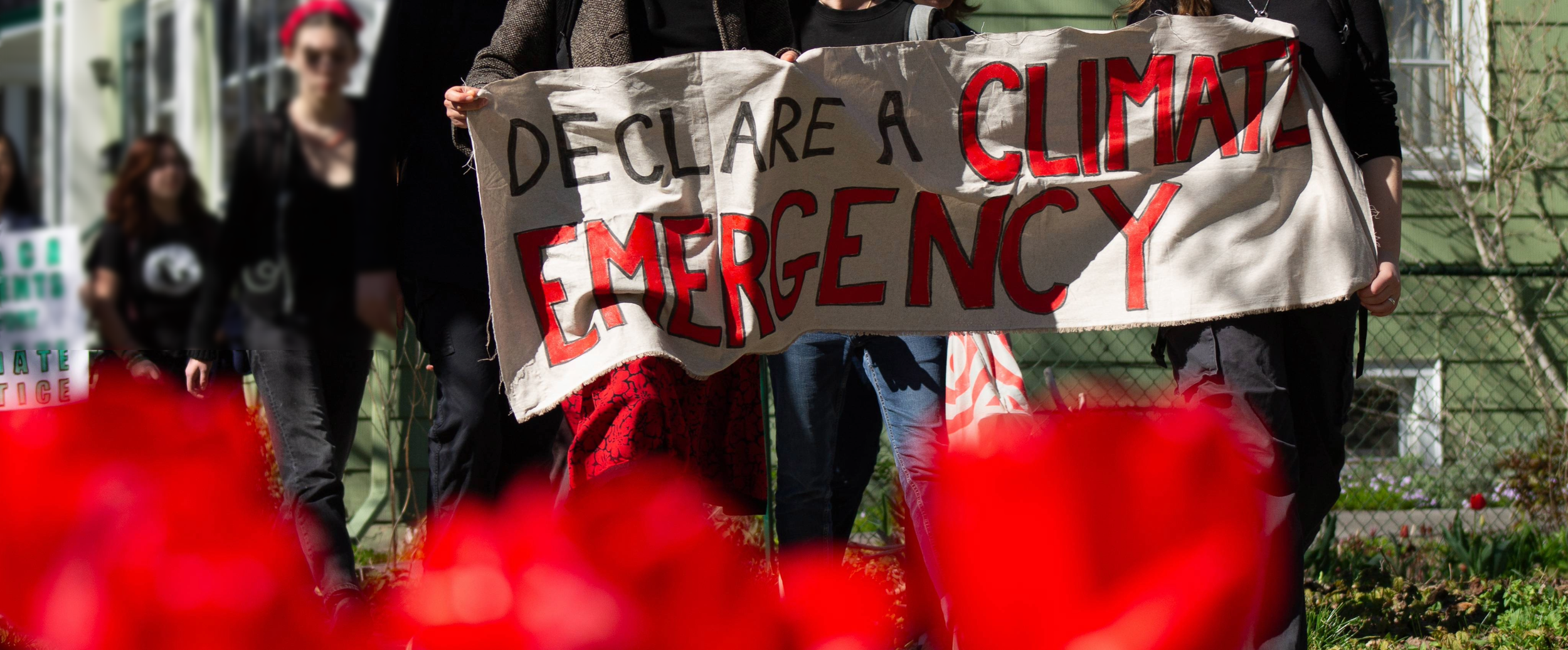
our demands
Click this button to add your name
These demands represent specific, actionable, and necessary—not noble—changes. They are radical because the climate science is clear: there is no non-radical future. We must immediately begin a deep and profound transformation towards a just, sustainable and zero-carbon future.
Our demands feature current initiatives already alive within Cornell and the larger community led by our Alliance Partners and Initiatives We Support. Our movement seeks to add force to these campaigns.
Each demand is informed by models implemented in university and non-university settings.
These demands are non-comprehensive and will grow to meet the changing needs of the campus and community. If you have input on this platform, please email us.
-
We call on Cornell to DECLARE A CLIMATE EMERGENCY and mobilize all its forces to address the climate crisis by enacting the following six changes, EXPEDITIOUSLY:
These demands hold up existing campaigns for climate justice at Cornell, in Ithaca, and beyond, while catalyzing new components of systemic transformation:
-
Publicly report and address the fact that Cornell is lagging far behind their Climate Action Plan to achieve carbon neutrality by 2035. Further, revise the Action Plan to halve emissions by 2030 and completely phase out the use of any fossil fuels by 2035. No known mechanism of “carbon neutrality” will avert climate catastrophe.
Do not project climate “plans” that preserve current levels of elite consumption while relying on unrealistic technological fixes, controversial carbon offsets, or technologies that do not yet exist.
Restructure the Climate Action Plan to prioritize high-confidence and equitable strategies consistent with a 1.5-degree pathway, including degrowth, real-time renewables, reduced consumption, and limits to energy demand, following leadership by the IPCC and European Union, and using community-rights based approaches.
Stop expanding campus: the greenest building is the one that already exists. Go beyond code with deep-energy retrofits that meet or exceed Ithaca’s progressive building code.
Redesign the university around climate-adapted mobility. No known flight options are compatible with university goals for zero-carbon emissions. Encourage systemic shifts to low-carbon commuting locally, enhanced regional and virtual participation, and curb aviation-based hypermobility.
By addressing the root causes of excessive consumption, waste, and growth associated with carbon-intensive culture, Cornell will reduce carbon inequality, lighten local pollution, and build capacity for adaptation and resilience in a climate-changed world. -
Expand climate-related curriculum, establish requirements for a climate curriculum for all undergraduates, and restructure the disciplines to train students for the future they will actually face.
Incentivize the work society needs scientists to do by changing tenure and promotion structures to value policy work, climate activism, public communication, and tangible broader impacts.
Faculty must speak honestly about the scale of the crisis.
Engage faculty, staff, and students in intensive public service to the local region.
Bring sufficient climate expertise onto Cornell’s Board of Trustees and create a Trustees climate change committee focused on addressing the existential issue of our time.
-
Fully divest from fossil fuels, including the endowment and TIAA pension funds, and enact full transparency in investments. Reinvest in transformative climate action, environmental justice, and initiatives led by climate justice communities and local municipalities, while banking for good.
Commit to fossil-free research and full transparency in the Office of Sponsored Projects, to end the documented use of fossil fuel research funds to deceptively forestall the necessary transition away from fossil fuels.
Ban campus recruitment by fossil fuel industries and its enablers and excessive users, such as the military and banks and insurers underwriting ecocide.
Address conflicts of interest within the Trustees and Administration.
-
Institute a hefty carbon pollution fee for every ton of ongoing greenhouse gas emissions, as other universities have done, and use the money to fund the energy transition, climate justice, and local resilience.
Mobilize and restructure the endowment to serve the greatest good in the face of a planetary crisis. As another campus movement points out: The endowment exists to secure the university for future generations of students—Cornell won’t be here for them if we don’t act wisely now.
Institute spaces for climate honesty and collective reckoning leading to healing and action.
Fulfill responsibilities to local communities and municipalities on mutual climate goals, justice for frontline communities, and Indigenous land reparations.
Cornell must pay its fair share to local municipalities, including the city, the county, the school district, and the transit system. Fund local decarbonization (e.g., Sustainable Finger Lakes Climate Fund), and create an expanded and electrified FreeCAT.
-
Identify allies from frontline communities and prioritize multiple perspectives in the implementation of systemic change at Cornell.
Recognize that Indigenous leadership is essential to effective climate action, as the United Nations and other bodies have done.
Adopt a reparative stance for climate change policy by centering climate reparations, land rights, Indigenous consent, and community-rights based approaches in all ongoing work.
Acknowledge that the climate emergency is a climate justice emergency, with responsibility and consequences distributed unequally. We have a moral obligation to dramatically reduce our emissions as part of the globe’s top 10% of carbon emitters.
-
Organize independent working groups charged with assessment and implementation, including external experts and climate justice community leaders.
Institute transparent accountability mechanisms and consistent reporting on progress.
Render these processes subject to ongoing public scrutiny and democratic participation, with the focused urgency required to meet our international climate targets for 2030 and 2035.
The Basis for Our Demands
We call on Cornell to Declare a Climate Emergency and enact comprehensive change for climate justice at a scale commensurate with the crisis.
IF NOT NOW, WHEN? Climate breakdown has begun. We are rapidly approaching ecological tipping points. The unequal burdens of the crisis are worsening. World leaders are calling for sweeping policy change now, but university operations and lifestyles continue to operate according to “business-as-usual.”
IF NOT HERE, WHERE? University action could be an inflection point in our society’s transition to climate resilience. By waking up to the high costs of "academia as usual" and taking bold action, Cornell can claim its role as a sustainability leader by modeling the transition from incrementalism to transformation.
IF NOT US, WHO? Recognizing our integral role as participants in this system, we will exercise our collective agency to direct Cornell's response to climate injustice and the ecological crisis. Together, we can drive the transition, hasten progress, and champion change that is already happening.
IF I’M ONLY FOR MYSELF, WHAT AM I? We are students, faculty, staff, alumni, community members, activists, and concerned global citizens. We are acting as part of something larger than ourselves: a movement to support life on these Gayogo̱hó:nǫɁ lands. We base our framework for action on Indigenous teachers who call on all people to restore right relationship with the living Earth and one another.
WE ARE READY TO MAKE TRADEOFFS IN THE NAME OF CLIMATE. As part of the top 10% of carbon-emitters globally, our affluent lifestyle emissions alone will use the entire globe’s carbon budget by 2033. We recognize the inequity of these emissions and that changes to our lifestyles are necessary to meet critical climate goals. We are willing to undertake and adapt to these changes together, and we solicit the collaboration of Cornell leadership to enact policies to get us there.
"What we need of both politicians and experts is nothing more than honesty - say you don't care about the climate crisis, or act in way that does justice to the vastness of the threat."
-Climate scientist Dr Wolfgang Knorr of Lund University (Sweden), in the Open Letter for Climate Activists

